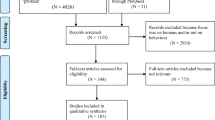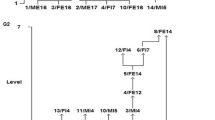Abstract
CERCOPITHECINE primates (Macaca, Papio, and Cercocebus spp.) typically live in cohesive groups containing many more adult females than adult males. Strong status hierarchies often exist within established groups, and one male in each group usually exerts an especially powerful influence on the behaviour of other group members. This individual commonly places himself between the group and any potential external threat and frequently interferes in intragroup aggressive encounters by attacking or threatening to attack one of the participants in the altercation1. An animal displaying this pattern of behaviour has been referred to as a “control animal” or as fulfilling a “control role”2.
Similar content being viewed by others
References
Bernstein, I. S., J. Comp. physiol. Psychol., 57, 404–406 (1964); Psychol. Rep., 14, 3–10 (1964); Primates, 7, 471–480 (1966).
Smith, E., Primates, 14, 413–419 (1973).
Tokuda, K., and Jensen, G., Primates, 9, 319–322 (1968).
Sackett, D., Oswald, M., and Erwin, J., J. biol. Psychol, 17, 17–20 (1975).
Erwin, N., and Erwin, J., Appl. Anim. Ethol. (in the press).
Dazey, J., Kuyk, K., Oswald, M., Martenson, J., and Erwin, J., Am. J. phys. Anthropol. (in the press).
Author information
Authors and Affiliations
Rights and permissions
About this article
Cite this article
OSWALD, M., ERWIN, J. Control of intragroup aggression by male pigtail monkeys (Macaca nemestrina). Nature 262, 686–688 (1976). https://doi.org/10.1038/262686a0
Received:
Accepted:
Issue Date:
DOI: https://doi.org/10.1038/262686a0
- Springer Nature Limited
This article is cited by
-
Hierarchy, kinship and social interaction among Japanese monkeys (Macaca fuscata)
Journal of Biosciences (1992)
-
Maintenance of cooperative life in forest and urban rhesus monkeys (Macaca mulatta)
Proceedings: Animal Sciences (1984)





